In this week's case discussion from Dr Terry Harvey, this 20x17mm pigmented lesion is present on...
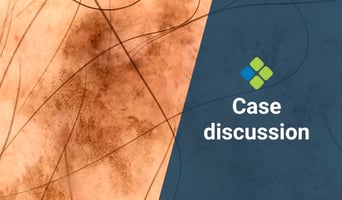
Learn surgical procedures for the nose and lower limbs, reconstruction techniques, skin grafts, and flaps.
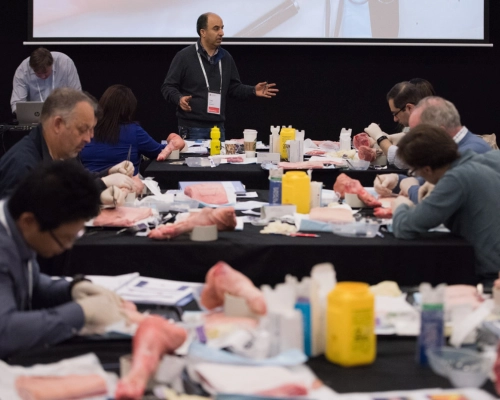
The program covers surgical procedures for the nose and the lower limb, reconstruction of alar and sidewall nasal defects, reconstruction of the nasal tip and glabellar defects, and skin grafts and flaps for the lower limb.
- This course is perfect for advanced practitioners with prior skin cancer surgery training.
- Delivered by an experienced team of GPs and doctors who practise exclusively in skin cancer medicine.
- This course is for medical doctors and International Medical Graduates.
- CPD-accredited and university-assured.
Fulfils 50 hrs for medical professionals in Australia
100% online
Online + workshop
Fully online: $2495
Online + workshop: from $3495
Special rates available
61.5hrs
Self-paced
2024
15 Jun in Adelaide
22 Sep in Sydney
13 Oct in Melbourne
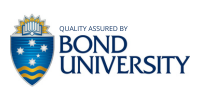
- Confidently perform a variety of flaps, such as neurovascular island, bilobed, banner, rhomboid, and V-Y.
- Master complex excisions with optimal wound closure and scarring results.
- Expand reconstructive options in cosmetically sensitive areas, such as eyelids and periorbital defects.
- Become a sought-after expert in skin cancer surgery and a referral option for colleagues.
Get unlimited access to all course content, additional learning materials, ongoing post-course support, and more.
*These topics are covered during the hands-on practical sessions in the optional skills workshop.
This module builds on the flap knowledge from the advanced certificate. The Bezier and keystone neurovascular island flaps come with blood supply so are not generally undermined and are cut all around the defect. These flaps are usually applied to the lower legs.
When preparing for skin cancer surgery, patient history and circumstances are to be considered. Neuropathies of the nerves and compartments of the leg are described. Blood supply to the planned flap must be ensured and infrared cameras assist with this.
Diagrams of how to mark out the Bezier and keystone flap including clinical cases and practical demonstrations assist learning. Advantages and disadvantages of these flaps are outlined. Recordings of planning and performing these flaps in both the clinical setting and on pork parts are included.
The bilobed flap is commonly used for reconstruction of nasal tip lesions, utilising the lateral nose and medial cheek. It may also be used for ear and cheek lesions. Nasal subunit images and guides to planning the flap repair are listed. The nasolabial angle determines the rotation of the nose and diagrams explain the angles.
Diagrams and schematics demonstrate the planning of the bilobed flap including the related mathematics. The bilobed flap typically rotates from a lateral pivot point for side wall and nasal tip defects. The nasal muscles, skin thickness, blood supply and the trigeminal nerve must all be considered with this flap. Recordings of planning and performing bilobed flaps in both the clinical setting and on pork parts concludes this module.
This module outlines the banner and rhomboid flaps to the lip, nose and ear. It is a revision of the Limburg flap from the advanced certificate. These flaps are versatile anywhere on the body to preserve tissue and move adjacent spare tissue to the excision area. Diagrams outline the standard rhomboid flap including skin tension lines.
The rhomboid flap marking out is from the defect outwards. Transposition flaps are similar to rhomboid in that it rotates about a pivot point however it differs in its design. Cosmetic subunits of the face, lips and chin and mathematical diagrams are included. Clinical images and recordings of planning and performing rhomboid flaps in the clinical setting are included in this module.
The V-Y flap is a neurovascular island flap with 3600 excision, no undermining and uses blood supply from underneath the wound area. The V-Y is useful on the nose, especially the side wall of the nose. Muscles of the nose are detailed.
Flaps are generally preferable to skin grafts because they have a better colour and contour match and heal faster. Drawings of the V-Y flap demonstrate its application. Variants of the V-Y are described including the horn flap, with clinical images demonstrating the planning and post-operative success. Recordings of the planning and performing V-Y flaps in both the clinical setting and on pork parts are included.
This module commences with a revision of the lip anatomy, blood, nerve and muscle supplies as understanding these are essential when planning lip wedges. Fundamental principles of lip wedge excision are explained including how to prevent microstomia.
Information on the Abbe lip switch, the Estlander flap and Gillies/Karapandzic flaps are explained. Schematic diagrams and clinical images are provided to demonstrate best practice planning techniques. Recordings in both the clinical setting and on pork parts are included.
This module focuses on planning how to remove lesions on the eyelids. Planning procedures in this sensitive area requires a considered approach. The subunits and eye anatomy are explained in addition to listing the essential principles and practical tips for lower eyelid surgery.
Comprehensive information for planning ellipses or flaps is included. The module then looks at when to use either the full thickness and split skin grafts and graft planning techniques including information on the donor and recipient sites. Recordings in the clinical setting are included.
A clinical recording of options for suture techniques on the chest, upper and lower limbs, the abdomen and also a clinical recording for suture techniques on the back are included including the advantages and disadvantages for these options. Mesh dressings for wound protection are detailed, again including the pros and cons. Procedural options are revisited on the face with clinical images to support planning for two defect closures.
If you're not interested in pursuing a full certificate in this field but simply want to enhance your skills in specific topics covered in this course, you can access the content of this and other courses for a flat fee of $83 per month (paid annually) within HealthCert 365.
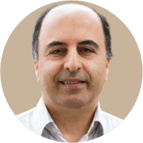
Senior Lecturer, The University of Queensland
Director at Newcastle Skin Check, Charlestown NSW
Dr Anthony Azzi graduated from the University of Sydney in 1989 and moved to Newcastle, where he spent the next 13 years working in the public hospital system. He now works in private practice as a Skin Cancer Doctor and Assistant Surgeon. He completed a Master of Medicine in Skin Cancer from The University of Queensland, where he is now a Senior Lecturer. He is a member of the Australian Medical Association, Skin Cancer College Australasia, and the Australian College of Rural and Remote Medicine.
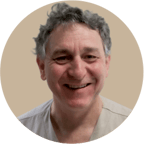
Dr Victor Harling
MBBS

Senior Lecturer, The University of Queensland
Doctor, Newcastle Skin Check
Dr Alister Lilleyman graduated from the University of Western Australia in 1994 and spent the next six years working in the public hospital system. After moving to Newcastle in 2003, he began working in private practice as a Skin Cancer Doctor, Assistant Surgeon, and Vein and Laser Physician. He completed a Master of Medicine degree in Skin Cancer Medicine from The University of Queensland, where he is now a Senior Lecturer. He is a proud member of the AMA (Australian Medical Association), College of Phlebology, and Fellow of the Skin Cancer College Australasia.

Study at your own pace and to your own schedule.
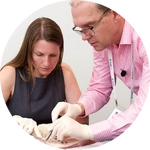
Complete your course online and receive all the benefits of online study, then put theory into practice at a small-group workshop.

Easily meet your CPD requirements and gain valuable skills – all in one place for $83 per month.
from $2495
.
Bundle two courses and save 5%, or three courses and save 10% upon enrolment.
Talk to us about deferred payment options, registrar scholarships and special rates.
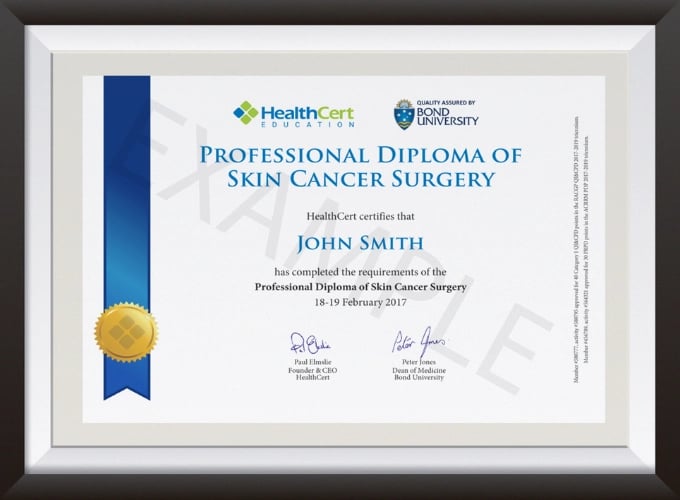

I'm currently completing both the Professional Diploma of Skin Cancer Surgery and the Professional Diploma of Dermoscopy and the progression over time in both courses has been superb. I am very pleased that these courses have tutors and are fully accredited.
Dr C. Boberg
Essential training for any GP with an interest in skin cancer management or diagnosis.
Dr M. Yeo
I have trained with HealthCert since 2010 and it has never disappointed me. I really enjoy the courses. Thank you!
Dr R. Phiri
Excellent and well presented content. I really enjoyed all the sessions. The course was well organised, relaxed and informative.
Dr D. Christian
| RACGP Activity Number | ACRRM Activity Number | Activity Title | Education Hours | Performance Hours | Outcome Hours | Total Hours | ||
|---|---|---|---|---|---|---|---|---|
| 408649 | 28534 | Banner and Rhomboid flaps | 408649 | 28534 | 3.5 | 5 | 0 | 8.5 |
| 408659 | 28536 | Lip Wedges | 408659 | 28536 | 3.5 | 5 | 0 | 8.5 |
| 408629 | 28533 | The Bilobed flap | 408629 | 28533 | 4 | 5 | 0 | 9 |
| 408665 | 28538 | Tips and Tricks revisited | 408665 | 28538 | 4 | 5 | 0 | 9 |
| 408653 | 28535 | V-Y Flaps and variants | 408653 | 28535 | 3.5 | 5 | 0 | 8.5 |
| 408617 | 28532 | Bezier and keystone neurovascular island flaps | 408617 | 28532 | 4.5 | 5 | 0 | 9.5 |
| 408661 | 28537 | Eyelids - Ellipses, flaps and grafts | 408661 | 28537 | 3.5 | 5 | 0 | 8.5 |
| 592320 | 31374 | Clinical Audit of Skin Cancer Surgery | 592320 | 31374 | 0 | 2 | 19.5 | 21.5 |
| Grand Total | 83 | |||||||
The optional Complex Skin Cancer Surgery Practical Workshop is accredited for 8.5 CPD hours total.
Education hours: 1
Performance hours: 7.5
The Professional Diploma of Skin Cancer Surgery is ideal for doctors with a special interest in skin cancer surgery. Participants can expect to work with noted doctors and gain the knowledge required to handle the most advanced surgical procedures on anatomically complex and cosmetically sensitive areas, thus reducing referrals and making you a favourable referral option for your peers.
The course is suitable for Medical Doctors and International Medical Graduates. Participants must have completed the Professional Certificate of Skin Cancer Surgery and Advanced Certificate of Skin Cancer Surgery (or qualifications deemed equivalent) in sequential order. It is recommended that 300 cases of skin cancer surgery have been completed before enrolling in this course.
Participants do not have to pass an IELTS test but, as the courses are delivered in English, proficiency in listening, reading and writing in English is assumed.
Participants will require access to a computer/laptop, an internet connection and a basic level of technology proficiency to access and navigate the online learning portal.
Professionally accredited qualifications and prior studies may be recognised for entry into this course. Please send an email to credit@healthcert.com for an individual assessment of your prior qualifications and experience. This email should contain information about your educational history and work experience that specifically pertain to the content and procedures covered in the Professional Certificate of Skin Cancer Surgery and Advanced Certificate of Skin Cancer Surgery. Please include any applicable certificates and course outlines from previous education. The relevant Course Chair will make a determination on your application within two to three weeks.
Doctors who have completed The University of Queensland certificate courses in skin cancer surgery are able to gain credit for those studies, providing the relevant HealthCert assessment is completed prior to diploma studies commencing (please ask a HealthCert Education Advisor for the process). Other qualifications and prior studies may also be recognised.
This certificate course meets the minimum 50 hours CPD annual requirement across all three mandatory CPD activity types.
Upon completion of all course requirements, you will receive the Professional Diploma of Skin Cancer Surgery certificate.
Participants who choose to complete the online course components only will receive the Professional Diploma of Skin Cancer Surgery Principles.
Australia-based course participants, please note that HealthCert certificates are not accredited by TEQSA or ASQA and do not fall within the Australian Qualification Framework. All HealthCert certificates are professional development awards.
To learn more about the delivery of certificates in Australia and overseas, please visit our FAQs.
RPL with Torrens University
This postgraduate pathway is for General Practitioners and degree-qualified medical practitioners who have successfully completed a HealthCert Professional Diploma (all three levels) in Skin Cancer Medicine, Skin Cancer Surgery or Dermoscopy. The following postgraduate course is offered entirely online through Torrens University: Master of Business Administration (MBA). Recognition of Prior Learning (RPL) is available for two general electives for any HealthCert Professional Diploma. In cases where a HealthCert alumni has completed two Professional Diplomas, they will be able to apply for four general electives towards the MBA. This will be helpful to further develop business, management and leadership capabilities. Please apply directly to Torrens University.
RPL with The University of Queensland
Master of Medicine (Skin Cancer)
Doctors who complete the HealthCert Professional Diploma programs in Dermoscopy, Skin Cancer Medicine, and Skin Cancer Surgery will receive RPL for the units IMED7002 and IMED7011, which are high-level subjects in the Master of Medicine (Skin Cancer) at The University of Queensland. The Master of Medicine is open only to registered medical practitioners with at least two years' postgraduate experience. IMED7002 is also a part of the Graduate Certificate Medicine (Skin Cancer); if a student (with two years' postgraduate clinical experience) who isn’t a registered medical practitioner has completed the HealthCert Dermoscopy pathway and the UQ units IMED7001, IMED7003 and IMED7010, they can receive the Graduate Certificate. View The University of Queensland Master of Medicine (Skin Cancer) program.
Postgraduate Pathway with the University of Plymouth
The Postgraduate Diploma in Minor Surgery is studied through the Rila Institute of Health Sciences and awarded by the University of Plymouth (UK).
There are three modules in the Postgraduate Diploma. Medical professionals who successfully complete the HealthCert Professional Certificate of Skin Cancer Surgery, Advanced Certificate of Skin Cancer Surgery and Professional Diploma of Skin Cancer Surgery will be eligible to apply for Accreditation of Prior Certified Learning (APCL) for module 3.
The Postgraduate Diploma is mainly delivered online. No practical workshops will be required due to the APCL from the HealthCert qualifications. Overall there will be a time saving of 40 per cent of the postgraduate program due to the APCL. Exams will be held in Perth, Western Australia.
When the Postgraduate Diploma has been successfully completed, doctors can apply for credit from the Postgraduate Diploma to the Master of Science in the Specialism awarded by the University of Plymouth.
Certified Clinical Attachments Pathway
Clinical attachments are optional and available on a 1:1 or small group basis. These provide the opportunity to observe skin cancer surgery and ask questions of the expert performing the procedures. In addition to clinical attachments in Australia, university teaching hospitals at the University of Lyon and the University of Vienna are available for clinical attachments. HealthCert certificates and university statements are awarded for participating in clinical attachments.
The dominant areas of study covered by The Université Claude Bernard Lyon 1 are science and medicine. Attached to the university are the "Hospices civils de Lyon" including the "Centre Hospitalier Lyon Sud", which is the largest teaching hospital in the Rhône-Alpes region and second largest in France. Out of the 2,630 faculty, 700 are also medical practitioners at local teaching hospitals.
The Medical University of Vienna is the largest medical
This organisation is an RACGP-accredited CPD provider under the RACGP CPD Program.
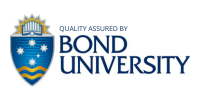

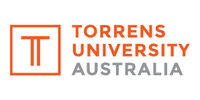
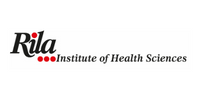
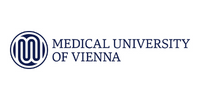
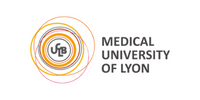


Don't see your question? Explore other faqs or talk to us.
Fees will vary based on the program and study option selected (fully online vs online + optional practical workshop). Payments can be made upfront or in monthly instalments. Special rates and various payment options are available. GP registrars and doctors in training enjoy a scholarship of up to $500. Talk to us to learn more.
Completion of any HealthCert course or attendance at an event will enable you to access the HealthCert Alumni Program which includes:
HealthCert Education is pleased to issue digital credentials for alumni. Digital credentials are a permanent online record of your successful completion of a HealthCert course and are issued to all course participants in addition to PDF certificates. If you are based in Australia, you also have the option to order a hard copy of your digital certificate for a small additional fee.
The recommended study duration of this certificate course is 61.5 hours, which includes study of the pre-course activities and readings, online lectures, live tutorials, and online assessment. This self-paced course offers the flexibility of 100% online study in your own time, at your own pace, in your own home or office, with no mandatory face-to-face requirements. You are not required to be online at specific times but can view and replay video lectures at your convenience.
All HealthCert courses meet World Federation of Medical Education standards. This certificate course qualifies for CPD hours from the Royal Australian College of General Practitioners (RACGP) and the Australian College of Rural and Remote Medicine (ACRRM) in Australia. It is recognised by the Royal New Zealand College of General Practitioners (RNZCGP) in New Zealand. It is recognised by the Hong Kong College of Family Physicians (HKCFP) in China. It is a self-submitted activity in Dubai and the United Kingdom. It is a self-submitted activity through the College of Family Physicians in Canada. If you live or work outside one of the above-mentioned countries, please contact us on admin@healthcert.com to discuss whether this course can be recognised in your country.
Want to stay up-to-date with the latest case studies, podcasts, free video tutorials and medical research articles pertinent to primary care?
Our Education Advisors can assist you with any queries and tailor our education pathway to suit your current expertise, interests and career goals.